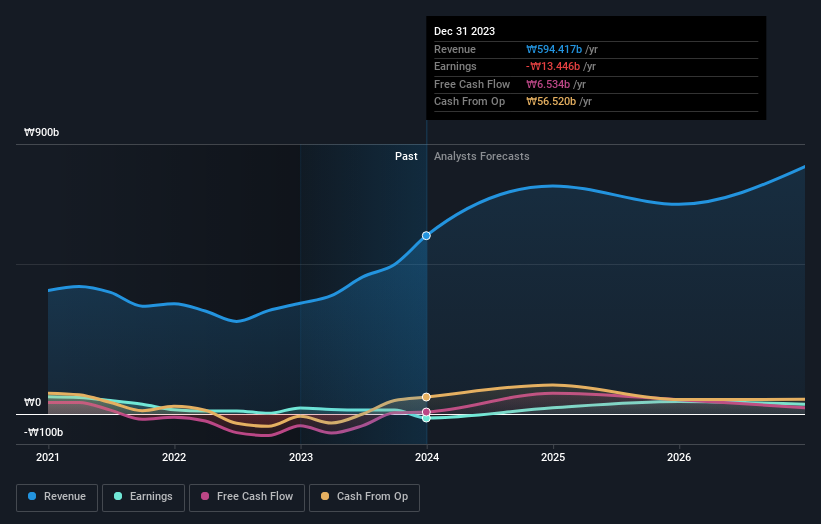- South Korea
- /
- Chemicals
- /
- KOSE:A017960
Retail investors account for 49% of Hankuk Carbon Co., Ltd.'s (KRX:017960) ownership, while insiders account for 36%

Key Insights
- The considerable ownership by retail investors in Hankuk Carbon indicates that they collectively have a greater say in management and business strategy
- A total of 12 investors have a majority stake in the company with 50% ownership
- 36% of Hankuk Carbon is held by insiders
Every investor in Hankuk Carbon Co., Ltd. (KRX:017960) should be aware of the most powerful shareholder groups. With 49% stake, retail investors possess the maximum shares in the company. In other words, the group stands to gain the most (or lose the most) from their investment into the company.
Individual insiders, on the other hand, account for 36% of the company's stockholders. Institutions often own shares in more established companies, while it's not unusual to see insiders own a fair bit of smaller companies.
Let's take a closer look to see what the different types of shareholders can tell us about Hankuk Carbon.
Check out our latest analysis for Hankuk Carbon

What Does The Institutional Ownership Tell Us About Hankuk Carbon?
Institutional investors commonly compare their own returns to the returns of a commonly followed index. So they generally do consider buying larger companies that are included in the relevant benchmark index.
Hankuk Carbon already has institutions on the share registry. Indeed, they own a respectable stake in the company. This can indicate that the company has a certain degree of credibility in the investment community. However, it is best to be wary of relying on the supposed validation that comes with institutional investors. They too, get it wrong sometimes. When multiple institutions own a stock, there's always a risk that they are in a 'crowded trade'. When such a trade goes wrong, multiple parties may compete to sell stock fast. This risk is higher in a company without a history of growth. You can see Hankuk Carbon's historic earnings and revenue below, but keep in mind there's always more to the story.

Hankuk Carbon is not owned by hedge funds. The company's CEO Moon-Soo Cho is the largest shareholder with 34% of shares outstanding. For context, the second largest shareholder holds about 4.7% of the shares outstanding, followed by an ownership of 4.2% by the third-largest shareholder.
A closer look at our ownership figures suggests that the top 12 shareholders have a combined ownership of 50% implying that no single shareholder has a majority.
Researching institutional ownership is a good way to gauge and filter a stock's expected performance. The same can be achieved by studying analyst sentiments. There are a reasonable number of analysts covering the stock, so it might be useful to find out their aggregate view on the future.
Insider Ownership Of Hankuk Carbon
While the precise definition of an insider can be subjective, almost everyone considers board members to be insiders. Management ultimately answers to the board. However, it is not uncommon for managers to be executive board members, especially if they are a founder or the CEO.
Most consider insider ownership a positive because it can indicate the board is well aligned with other shareholders. However, on some occasions too much power is concentrated within this group.
It seems insiders own a significant proportion of Hankuk Carbon Co., Ltd.. Insiders own ₩189b worth of shares in the ₩522b company. This may suggest that the founders still own a lot of shares. You can click here to see if they have been buying or selling.
General Public Ownership
With a 49% ownership, the general public, mostly comprising of individual investors, have some degree of sway over Hankuk Carbon. While this size of ownership may not be enough to sway a policy decision in their favour, they can still make a collective impact on company policies.
Next Steps:
It's always worth thinking about the different groups who own shares in a company. But to understand Hankuk Carbon better, we need to consider many other factors. Consider risks, for instance. Every company has them, and we've spotted 2 warning signs for Hankuk Carbon you should know about.
But ultimately it is the future, not the past, that will determine how well the owners of this business will do. Therefore we think it advisable to take a look at this free report showing whether analysts are predicting a brighter future.
NB: Figures in this article are calculated using data from the last twelve months, which refer to the 12-month period ending on the last date of the month the financial statement is dated. This may not be consistent with full year annual report figures.
Valuation is complex, but we're here to simplify it.
Discover if Hankuk Carbon might be undervalued or overvalued with our detailed analysis, featuring fair value estimates, potential risks, dividends, insider trades, and its financial condition.
Access Free AnalysisHave feedback on this article? Concerned about the content? Get in touch with us directly. Alternatively, email editorial-team (at) simplywallst.com.
This article by Simply Wall St is general in nature. We provide commentary based on historical data and analyst forecasts only using an unbiased methodology and our articles are not intended to be financial advice. It does not constitute a recommendation to buy or sell any stock, and does not take account of your objectives, or your financial situation. We aim to bring you long-term focused analysis driven by fundamental data. Note that our analysis may not factor in the latest price-sensitive company announcements or qualitative material. Simply Wall St has no position in any stocks mentioned.
About KOSE:A017960
Hankuk Carbon
Produces and sells carbon fiber, synthetic resine, and glass paper related products in South Korea.
Excellent balance sheet and fair value.


